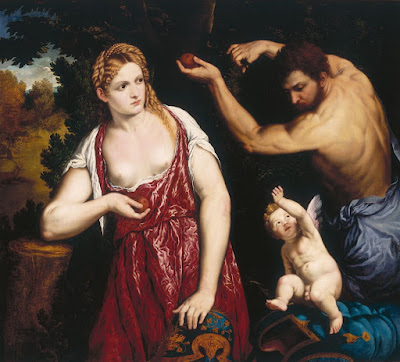 |
| Roman Empire Antefix with Venus and Mars (cover for open end of roof tile) 1st century BC - 1st century AD terracotta (with traces of original paint) Metropolitan Museum of Art, New York |
-Galleria-Borghese-Rome.jpg) |
| Roman Empire Venus, Mars and Cupid AD 100-150 marble statue group (heavily restored, 17th century) Galleria Borghese, Rome |
-c1500-bronze-partly-gilt-and-inlaid-with-silver-Metropolitan-Museum-of-Art-New-York.jpg) |
| attributed to Gian Marco Cavalli Mars, Venus and Cupid at the Forge of Vulcan (The Mantuan Roundel) ca. 1500 bronze, partly gilt and inlaid with silver Metropolitan Museum of Art, New York |
-Triumph-of-Mars-c1509-detached-fresco-(ceiling-panel)-Metropolitan-Museum-of-Art-New-York.jpg) |
| Pinturicchio (Bernardino di Betto) Triumph of Mars ca. 1509 detached fresco (ceiling panel) Metropolitan Museum of Art, New York |
 |
| attributed to Giulio Campagnola Venus and Mars ca. 1510 oil on paper, mounted on canvas Brooklyn Museum |
 |
| Sebald Beham Mars 1539 engraving Art Institute of Chicago |
 |
| Paris Bordone Mars, Venus and Cupid ca. 1550-60 oil on canvas Palazzo Doria Pamphilj, Rome |
 |
| Jacopo Bertoia Venus and Mars ca. 1566-68 oil on plaster, transferred to canvas Galleria Nazionale di Parma |
 |
| Johannes Wierix Mars and Venus ca. 1580 drawing on vellum Ashmolean Museum, Oxford |
 |
| Hendrik Goltzius Mars ca. 1590 engraving Graphische Sammlung Albertina, Vienna |
-c1690-engraving-Harvard-Art-Museums.jpg) |
| Nicolas Dorigny after Raphael Mars (Cupola Mosaic, Chigi Chapel, Rome) ca. 1690 engraving Harvard Art Museums |
 |
| Jean-Pierre Norblin Mars and Venus ca. 1785 oil on canvas Museum of Fine Arts, Budapest |
 |
| Francesco Caucig (Franz Kavčič) Vulcan surprising Venus and Mars asleep ca. 1790 drawing Graphische Sammlung Albertina, Vienna |
 |
| James Gillray General George Walpole as Mars 1799 hand-colored etching National Gallery of Victoria, Melbourne |
 |
| Anonymous Dutch Artist Model of Ship's Figurehead as the God Mars ca. 1800-1850 carved wood Rijksmuseum, Amsterdam |
 |
| Georges Seurat Antique Statue of Mars ca. 1877-78 drawing (academic exercise after a plaster cast) Museum of Fine Arts, Boston |
The Recompense
The night of the comet,
Sunset gone, and shadow drawing down
Into itself landscape, horizon, sky,
We climbed the darkness. Touch
Was all we had to see by, as we felt
For a path among the crowding trees:
Somehow, we threaded them, came through
At last to the vantage we had aimed for:
It was viewless: a sole star,
The cold space round which seemed
The arena a comet might be found
Sparkling and speeding through, if only
One waited long enough. We waited.
No comet came, and no flame thawed
The freezing reaches of our glance: loneliness
Quelled all we saw – the wide
Empire of that nightworld held
To the sway of centuries, sidereal law,
And the silent darkness hiding every star
Save one: had we misheard the date?
A comet, predicted, might be late
By days perhaps? Chilled, but unwillingly
We took the tree-way down; and ran
Once feet, freed from obstruction,
Could feel out the smoothest path for us
From wood to warmth. Now that we faced away
From the spaces we had scanned for light,
A growing glow rose up to us,
Brought the horizon back once more
Night had expunged: it travelled contrary
To any comet, this climbing brightness:
We wound the sight towards us as we went,
The immense circle of the risen moon
Travelling to meet us: trees
Wrote themselves out on sea and continent,
A cursive script where every loop and knot
Glimmered in hieroglyph, clear black:
We – recompense for a comet lost –
Could read ourselves into those lines
Pulsating on the eye and to the veins,
Thrust and countercharge to our own racing down,
Lunar flights of the rooted horizon.
– Charles Tomlinson (1981)
Sunset gone, and shadow drawing down
Into itself landscape, horizon, sky,
We climbed the darkness. Touch
Was all we had to see by, as we felt
For a path among the crowding trees:
Somehow, we threaded them, came through
At last to the vantage we had aimed for:
It was viewless: a sole star,
The cold space round which seemed
The arena a comet might be found
Sparkling and speeding through, if only
One waited long enough. We waited.
No comet came, and no flame thawed
The freezing reaches of our glance: loneliness
Quelled all we saw – the wide
Empire of that nightworld held
To the sway of centuries, sidereal law,
And the silent darkness hiding every star
Save one: had we misheard the date?
A comet, predicted, might be late
By days perhaps? Chilled, but unwillingly
We took the tree-way down; and ran
Once feet, freed from obstruction,
Could feel out the smoothest path for us
From wood to warmth. Now that we faced away
From the spaces we had scanned for light,
A growing glow rose up to us,
Brought the horizon back once more
Night had expunged: it travelled contrary
To any comet, this climbing brightness:
We wound the sight towards us as we went,
The immense circle of the risen moon
Travelling to meet us: trees
Wrote themselves out on sea and continent,
A cursive script where every loop and knot
Glimmered in hieroglyph, clear black:
We – recompense for a comet lost –
Could read ourselves into those lines
Pulsating on the eye and to the veins,
Thrust and countercharge to our own racing down,
Lunar flights of the rooted horizon.
– Charles Tomlinson (1981)